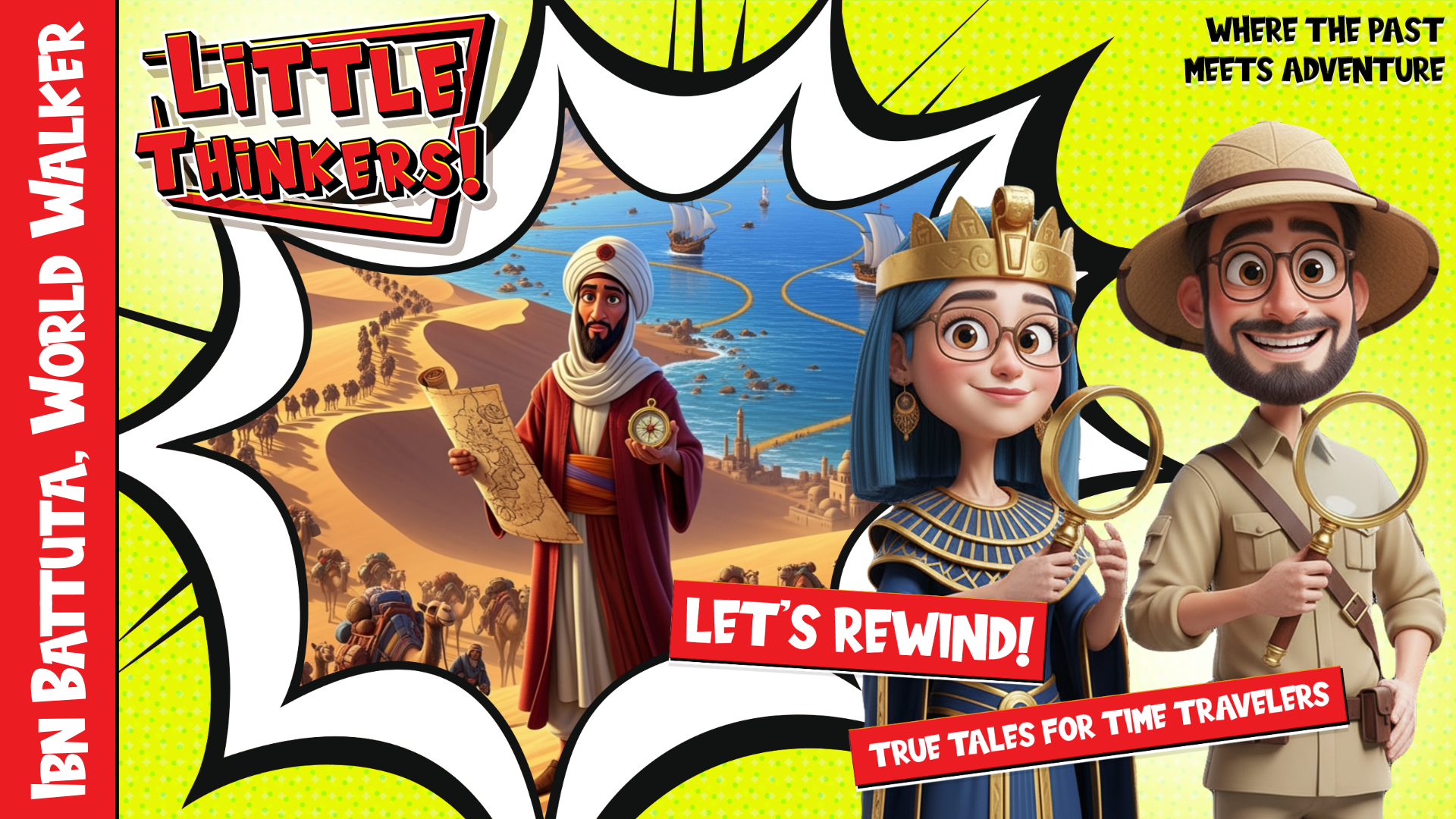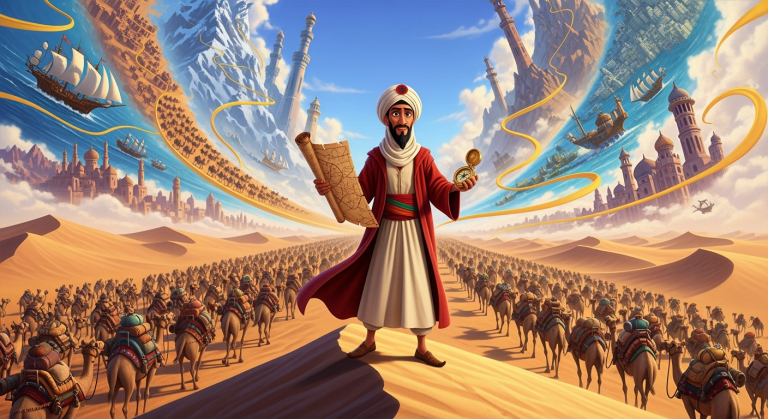The Greatest World Walker: Ibn Battuta’s Amazing Journey
Imagine Setting Off to See the Whole World
Picture this: You’re 21 years old, standing at your front door with just a small bag and big dreams. Your parents give you one last hug. You’re about to walk out and explore the entire world – without any airplanes, cars, or even good maps! That’s exactly what a brave young man named Ibn Battuta did almost 700 years ago. He started with just one goal: to visit the holy city of Mecca. But his journey became so much more – the most incredible adventure in history!
Ibn Battuta didn’t just travel for fun. He was a qadi – that’s a smart judge who knows religious law. But he was also incredibly curious about people, places, and cultures. By the time he finished traveling, he had walked and sailed over 73,000 miles! That’s like going around the Earth three times!
The Adventure Begins in Morocco
Our story starts in 1325 in Tangier, Morocco. The morning air smells of salt from the nearby sea. Young Ibn Battuta tightens his leather sandals and checks his simple bag. Inside, he carries a book of prayers, some coins, and the most important thing of all – his determination to learn about the world.
The caravan of camels and traders stretches like a long, moving line across the desert. Caravans were like ancient buses – groups of people who traveled together for safety. The camels grunt and kneel down to be loaded with supplies. Ibn Battuta takes one last look at his white-walled hometown, then turns his face toward the unknown.
Fun Fact!
Ibn Battuta’s real name was Abu Abdullah Muhammad ibn Battutah! People called him Ibn Battuta for short, which means “son of Battuta.” His full name would have been much longer – medieval people often had names that told you about their family, hometown, and job!
Learning the Ropes: From Morocco to Egypt
The first part of his journey taught him everything about being a smart traveler. Move early in the morning when it’s cool. Rest during the burning hot noon. Always share your water with others. Respect your guides – they know where the dangerous spots are!
Ibn Battuta traveled through amazing cities like Tunis, where markets buzzed with traders selling dates, almonds, and colorful cloth. In Tripoli, he studied with wise teachers in beautiful mosques. At night, under a blanket of stars that seemed close enough to touch, he wrote notes by flickering lamplight.
When he reached Alexandria in Egypt, sailors told him stories about the famous lighthouse that used to guide ships. Even though it was gone, the city still buzzed with boats and merchants from all over the world. The Nile River flowed through Cairo like a green ribbon, bringing life to farms and feeding thousands of people.
Did You Know?
- In the 1300s, Cairo was one of the biggest cities in the world – bigger than London or Paris!
- Travelers had to carry everything they owned, so Ibn Battuta probably had just one change of clothes
- Desert caravans could have hundreds of camels and take weeks to cross from city to city
The Holy Pilgrimage: Following Ancient Routes
From Cairo, Ibn Battuta had three choices to reach Mecca. He could take a dangerous route across the desert, risk the pirate-filled Red Sea, or take the long but safe northern route through Damascus. Being smart, he chose safety!
Damascus was like stepping into a fairy tale. Water sang in peaceful courtyards. Fountains cooled the air on hot days. The spice markets glowed with golden saffron and fiery red pepper. Teachers welcomed him to their learning circles, where students sat cross-legged and asked thoughtful questions.
When the great pilgrim caravan formed, it was like a moving city! Hundreds of tents bloomed like colorful flowers. Thousands of camels knelt to be loaded with supplies. The call to prayer floated through the warm evening air as they headed south toward Mecca.
So Cool to Know!
The Hajj pilgrimage to Mecca was just as important 700 years ago as it is today. Pilgrims came from all over the known world – from Spain in the west to China in the east. Ibn Battuta met people speaking dozens of different languages, all united by their faith!
Beyond the Holy Cities: When One Journey Becomes Many
After completing his religious duties in Mecca and Medina, most pilgrims would have headed home. But not Ibn Battuta! Meeting travelers from Yemen, Persia, and beyond had filled his head with amazing stories. The road wasn’t done with him yet.
He journeyed to Baghdad, where the great libraries once held the world’s knowledge. Scholars still gathered in quiet rooms along the Tigris River, debating and sharing wisdom. Ibn Battuta listened, asked respectful questions, and filled his notebook with fascinating details about food, customs, and local laws.
Then came Persia, with its snow-dusted mountains and busy trading cities like Tabriz. Caravanserais – those were like ancient motels – offered travelers warm walls, fresh water, and hot meals. Ibn Battuta learned the polite customs of each place: remove your shoes here, bow respectfully there, always share salt before making a business deal.
Into the Frozen North: Adventure in the Golden Horde
Here’s where Ibn Battuta’s journey gets really exciting! He traveled north to the lands of the Golden Horde, where the grasslands stretched like an endless green ocean. The air grew so cold that his breath came out in white puffs!
The people here lived in felt tents that moved with the seasons. Their horses were incredibly fast and proud. Herders guided huge flocks across the vast steppes. Ibn Battuta held bowls of hot milk in his frozen fingers and felt grateful for every bit of warmth.
He even visited the royal court at Sarai on the Volga River. It was like a giant moving palace made of hundreds of beautiful tents! He witnessed gifts of precious furs, hunting falcons, and golden cups being exchanged between rulers.
Believe It or Not!
Some historians think Ibn Battuta reached Constantinople (today’s Istanbul) with a royal wedding party. If true, he would have walked where Europe and Asia almost touch each other – pretty amazing for someone from Morocco!
The Sea Roads: Adventure on the Ocean
After years of dusty caravan routes, Ibn Battuta discovered the sea roads! Ships became his new camels, and harbors became his new caravanserais. The East African coast opened up a world of coral-stone cities and busy trading ports.
In cities like Mogadishu and Kilwa, merchants weighed ivory, spices, and gold on brass scales. Tall coral houses lined the harbors. Sailors taught him how to read the stars for navigation – different stars than he knew from the desert!
The Indian Ocean was like a liquid highway. Monsoon winds filled the sails like giant lungs, pushing ships across vast distances. When the winds changed direction, the whole sea became a different road!
Sailor’s Secret!
Medieval sailors were incredibly skilled! They could tell their location by watching birds, smelling the air, and reading the color of the water. They knew that certain seabirds meant land was near, and different types of seaweed told them about underwater currents.
Judge Ibn Battuta: Life in the Court of Delhi
When Ibn Battuta reached India, something amazing happened. The Sultan of Delhi, Muhammad bin Tughluq, needed judges who knew Islamic law. Ibn Battuta was perfect for the job! He could speak Arabic clearly and write beautifully.
Suddenly, our world-walking traveler was sitting in a grand palace where silk clothes rustled like leaves in the wind. People brought him legal cases to solve. He listened carefully and made fair decisions. The Sultan rewarded him with so many gifts that he needed servants to carry them all!
But court life was tricky. The Sultan could be incredibly generous one day and dangerously angry the next. Ibn Battuta learned to speak very carefully and stay alert. At night, he continued writing his travel notes, organizing his memories like rows of glowing lamps.
Court Life Facts!
- Medieval Indian courts were incredibly wealthy – judges received gifts of gold, silk, horses, and even elephants!
- Sultan Muhammad bin Tughluq was famous for his intelligence and his unpredictable temper
- A qadi (judge) had to know religious law, local customs, and how to deal with very powerful people
Mission to China: When Everything Goes Wrong
The Sultan chose Ibn Battuta for an incredibly important mission – to be his ambassador to China! This was a huge honor, but also a way to leave Delhi safely. Ibn Battuta prepared precious gifts and official letters, then traveled to the port city of Calicut on India’s west coast.
Calicut smelled like pepper and adventure. The harbor was full of ships with curved prows and white sails. Everything seemed perfect for the journey to China. Then disaster struck!
A massive storm roared in like a gray mountain of wind and rain. Waves pounded the harbor. The ship carrying all the precious gifts for China broke loose from its moorings and smashed to pieces! Ibn Battuta watched from shore with a heavy heart – his mission was ruined before it even started.
But did he give up? Never! He found another ship and tried again. This time, pirates attacked! They swarmed the vessel like angry hornets. Ibn Battuta lost his books, his money, and most of his clothes. But he kept the most important things: his courage and his faith.
Island Paradise: The Maldives Adventure
Sometimes when life gives you storms and pirates, you end up somewhere amazing! Ibn Battuta found himself in the Maldives – hundreds of tiny islands scattered across the bright blue Indian Ocean like emeralds on silk.
The Maldivian people were wonderful! They loved order, fishing, and keeping their islands clean. They needed a judge who understood Islamic law, and Ibn Battuta was perfect. He accepted the job and began a completely new chapter of his adventure.
Life on coral islands was magical. Fishing boats returned each day with shining tuna. Breadfruit roasted over coconut-husk fires. Palm trees whispered in the constant ocean breeze. He even married there, following local customs, and learned the island way of life.
Island Life Was Different!
- The Maldives had no horses, camels, or cows – everything arrived by boat
- Fresh water came from rainwater collected in tanks
- Women had much more freedom than in many other places Ibn Battuta had visited
- The main currency was cowrie shells, not gold or silver coins!
The Long Road to China
Eventually, Ibn Battuta decided to continue his original mission to China. He island-hopped through the warm waters of Southeast Asia, stopping in places where cinnamon bark scented the air and traders weighed pepper on brass scales.
The sea journey to China was long and sometimes dangerous. Storms came and went. The ship’s crew spoke many different languages, but they worked together like musicians in an orchestra. When China finally appeared on the horizon, it came slowly and majestically, like a sleeping giant waking up.
In Chinese ports, bamboo poles clicked against boats in the harbors. Canals flowed through cities like silver ribbons. Shops displayed beautiful silk and perfectly crafted porcelain bowls that seemed to glow from within. Ibn Battuta visited mosques built by Muslim traders and wrote careful notes about bridges, markets, and the polite habits of the people.
Amazing China Facts!
In the 1300s, Chinese cities were incredibly advanced! They had paper money, efficient postal systems, and canals that worked like highways for boats. The city of Quanzhou was one of the busiest ports in the world, welcoming traders from as far away as Africa and Europe.
The Journey Home: Facing the Black Death
After many years in the East, Ibn Battuta began his long journey home. But the world was changing. A terrible disease called the Black Death was spreading across many lands. When he reached Damascus in the late 1340s, he found streets quieter than before.
Instead of focusing on the sadness, Ibn Battuta wrote about the brave helpers and strong families who took care of each other. He respected their courage and noted their kindness. When it was safe, he continued with caravans toward home.
He performed another Hajj pilgrimage with a grateful heart. After so many years on the road, he had learned the most important travel habits: be patient, be thankful, and share whatever you can with others.
One Last Great Adventure: Crossing the Sahara
You might think Ibn Battuta was ready to settle down, but no! He heard about a wealthy kingdom called Mali beyond the great Sahara Desert. His adventurous heart couldn’t resist one more incredible journey.
Crossing the Sahara was like sailing across an ocean made of sand and stone. Days were blazing white and hot. Nights were black velvet sprinkled with more stars than seemed possible. Camels carried slabs of precious salt that clinked together like giant bones.
Water was more valuable than gold in the desert. Guides tasted the wind to choose directions and studied the sand to find the safest paths. Ibn Battuta learned to wrap his face against sandstorms and walk beside the camels to save their strength for carrying supplies.
When they finally reached the lands of Mali, green returned like a miracle! The Niger River flowed peacefully, and the air filled with the wonderful smells of cooking millet and grilled fish. Drums welcomed the desert caravan to this new world.
Desert Survival Secrets!
- Sahara guides could navigate by wind patterns, star positions, and even the shapes of sand dunes
- A full goatskin of water could mean the difference between life and death
- Salt was so valuable in Mali that it was sometimes worth more than gold!
- Desert travelers moved mainly at dawn and dusk, resting during the hottest part of the day
In the Kingdom of Mali: Gold, Salt, and Wisdom
The Kingdom of Mali amazed Ibn Battuta with its wealth and organization. He visited the court of Mansa Suleyman and watched how gold dust was carefully measured and justice was fairly administered. He saw respectful ceremonies and heard beautiful music with steady drums and soft flutes.
He crossed ferries on the Niger River and met scholars in towns along its banks. He observed how salt from the Sahara was worth its weight in gold. He praised the safety that travelers enjoyed and the generous hospitality of his hosts.
Though he heard fascinating stories about the legendary city of Timbuktu, historians aren’t sure if he actually visited there. But he certainly learned about this famous center of learning and trade from the people he met.
The Final Return: Writing Down a Lifetime of Adventures
When Ibn Battuta finally returned to Morocco around 1354, he had been traveling for nearly 30 years! The Sultan of Fez heard about his incredible journeys and commanded that his stories be written down for future generations.
A skilled writer named Ibn Juzayy worked with Ibn Battuta in a quiet, cool room. The traveler spoke while the writer shaped his words into beautiful sentences. Together, they created a book called a Rihla – which means “journey” in Arabic.
This wasn’t just any travel book. It was a detailed account of 73,000 miles of adventures! It described storms and kings, teachers and cooks, markets and mosques, baths and battlefields. The pages shimmered with careful details about more than 40 different countries and regions.
The Book That Changed Everything!
Ibn Battuta’s Rihla became one of the most important travel books ever written! It showed Europeans a wider world than they had imagined. It described advanced civilizations, busy trade routes, and connections between distant cultures that many people never knew existed.
Why Ibn Battuta’s Story Still Matters Today
Ibn Battuta wasn’t just a tourist – he was a bridge between worlds! His journey showed that in the 1300s, the world was already connected by trade, faith, learning, and friendship. Muslim scholars in China could have conversations with scholars in Spain. Traders from Africa knew merchants in India. Ideas and inventions traveled along the same routes as spices and silk.
He proved that being curious about other people and cultures makes the world a bigger, more interesting place. He listened before he judged. He learned before he taught. He showed respect for differences while looking for similarities.
Most importantly, Ibn Battuta showed that adventure doesn’t require being the strongest or richest person. It requires courage, curiosity, and kindness. He didn’t conquer lands – he conquered ignorance. He didn’t carry weapons of war – he carried a pen and an open heart.
Ibn Battuta’s Amazing Records!
- He traveled three times farther than the famous Marco Polo
- His journey covered territory that today includes more than 40 countries
- He served as a judge in at least four different regions
- He survived storms, pirates, political upheavals, and even the Black Death
- He crossed the Sahara Desert twice – once each way!
Adventure Is Still Everywhere Around Us!
Today, we can fly around the world in less than a day, but Ibn Battuta’s spirit of adventure is still important. Every time you try to understand someone different from you, you’re following his path. Every time you read about a distant place or learn a new language, you’re becoming a world walker too.
Maybe you can’t spend 30 years traveling the world (you have school, after all!), but you can be curious about your neighbors, kind to strangers, and excited about learning new things. You can ask questions, listen to answers, and remember that everyone has interesting stories to share.
Ibn Battuta started as a young person with sandals and big dreams. He became a legend with a pen and respectful heart. His footsteps connected shores and deserts, cities and islands, peoples and cultures. That connection still matters today – and you can be part of it too!
Be Your Own Explorer!
You don’t need to cross deserts or sail dangerous seas to be an explorer. Try a new food, learn hello in another language, or read about a country you’ve never heard of. Ask your grandparents about their childhood, or interview someone from another culture. Every act of curiosity and kindness makes you a world walker like Ibn Battuta!













